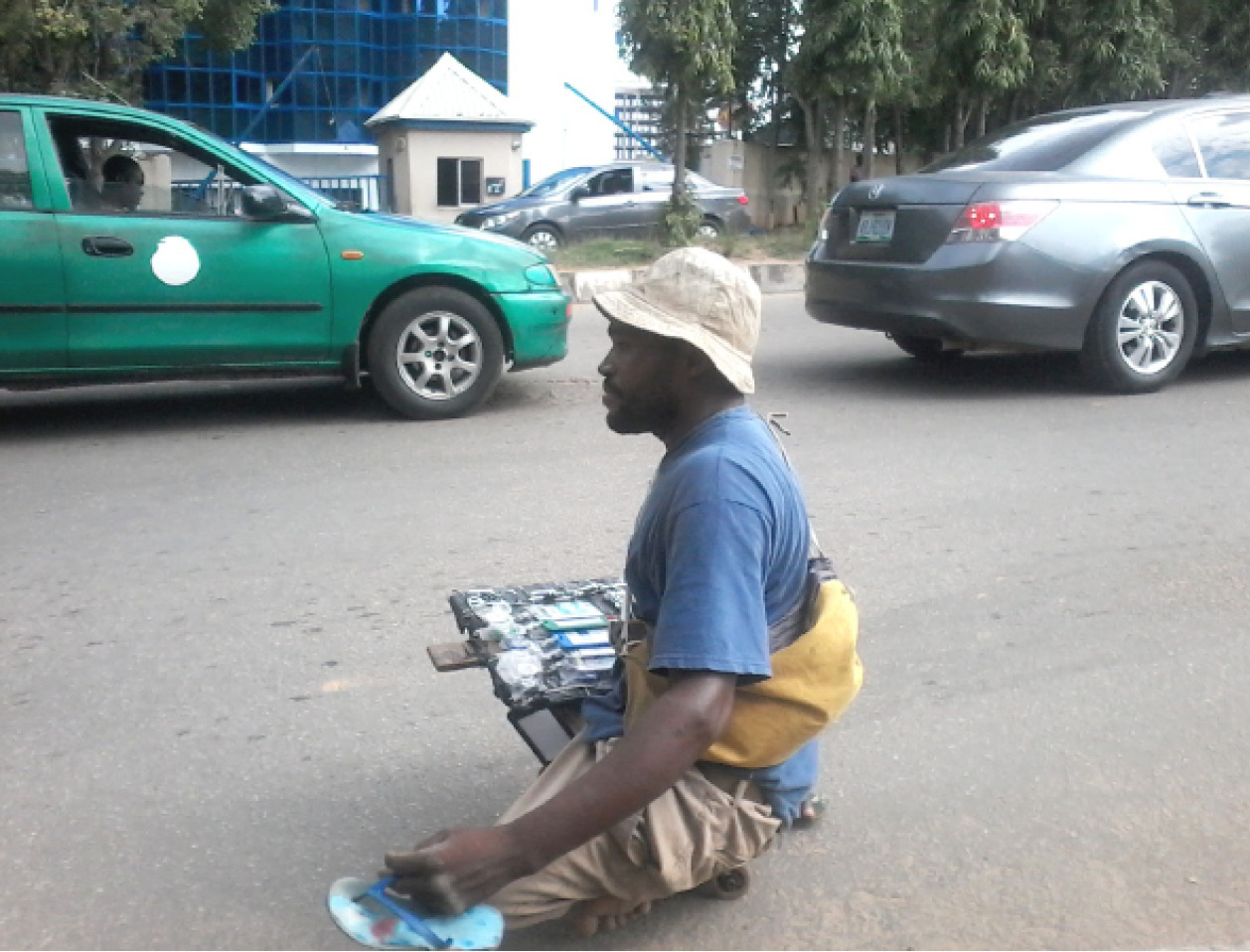Green light, red light: ‘Our lives depend on traffic stops’
Traffic lights are no longer beneficial to only motorists. Hawkers prefer to see it blink red so they get to sell their products. When the traffic light turns red at Arab Junction in Utako or Jabi Junction, Mu’azu Muhammed pedals hard and you wonder how he does it in his crippled state; one hand gripping […]

Mu’azu Muhammed expertly manoeuvres through traffic to make a sale
Traffic lights are no longer beneficial to only motorists. Hawkers prefer to see it blink red so they get to sell their products.
When the traffic light turns red at Arab Junction in Utako or Jabi Junction, Mu’azu Muhammed pedals hard and you wonder how he does it in his crippled state; one hand gripping a board from which key holders, ID card holders, rings and several other items hang from. His is a story of self-sustenance even while disabled. But he wasn’t always like this.
Muhammed was strong and agile as a child in Katsina, his home state, before he suffered severe fever and became paralysed. He had his education in an Islamic school before he relocated to Abuja in 2005 and started begging for alms.
Although some people did give money to Muhammed on the streets of Abuja, he got tired of being disrespected and decided to make his own money. That was how, along with a partner, he started making shoes in Zone 3. Unfortunately, the market was later destroyed so he switched to trading in nail cutters, key holders and other portable items where there are traffic lights.
When the traffic lights turn green, Muhammed skillfully pedals off the road and waits patiently for it to blink back to red. “Sometimes, I make as much as N1,500 in a day or as low as N500,” he says. “I sell a key holder or nail cutter for N200 or N400, depending on the size.”
Although disabled, Muhammed, who is in his early forties, has a dream. Someday he hopes to learn a technology-related skill in a formal school. But for now, he craves for a permanent space where he can sell his products without having to manoeuvre amidst traffic.
Muhammed’s story is just one amongst many. In Wuse II, women and girls selling bananas or hawking groundnuts sit by the roadside. When the lights turn red, they grab their trays and hasten toward cars whose drivers wind down their glasses to purchase from them.

Stanley Amos (not real name) sells magazines for a living. While others trade in edibles, he figures this would give him an edge. “Where there are traffic lights is the ideal place to get customers,” he explains. “Not many drivers will like to park their cars and buy your product.”
At a junction in Utako, Ogbonna Uneke dangles wristwatches before windows of vehicles. Like many others who depend on the traffic lights, he has to be patient in order to make sales. Sometimes, he goes a whole day without selling a single item. “But then I have made as much as N3,000 in a day. That is one of the highest amounts I have made,” he says.
Uneke began selling wristwatches about a year ago. “I have eyes for good wristwatches. If I had money to buy as many as I want, I would have made it big. I will go to Lagos and buy many.”

But sometimes, the activities of hawkers at intersections hinder the smooth flow of traffic – most with traffic lights have become a marketplace for them within the city. Motorists bark at them to get out of the way when the lights turn green while the hawkers try to sell quickly to buyers. Most times, they have to chase after a car to either give a product to a buyer or collect payment. The story is the same in places like Zone 4, Garki District and several other parts of the capital city.
